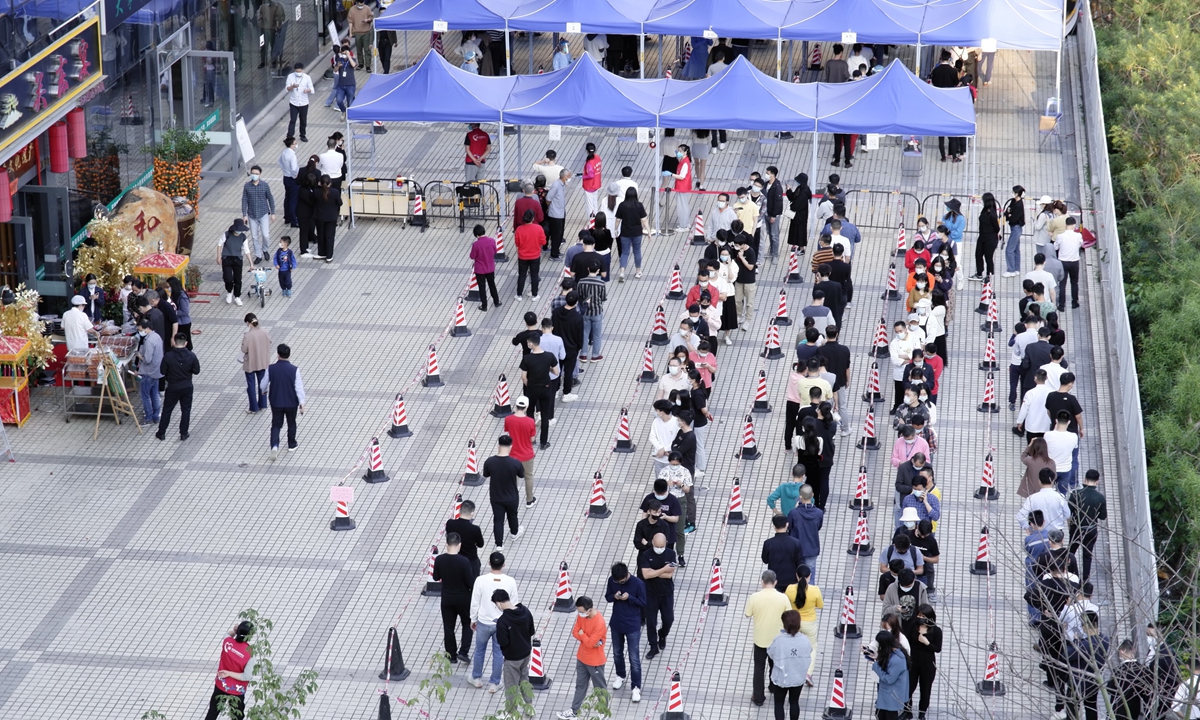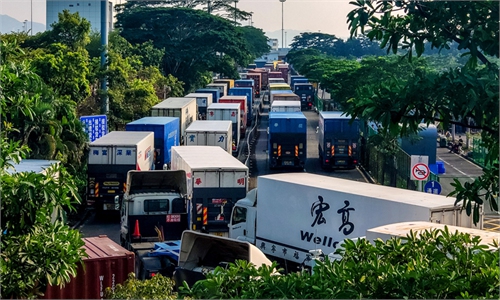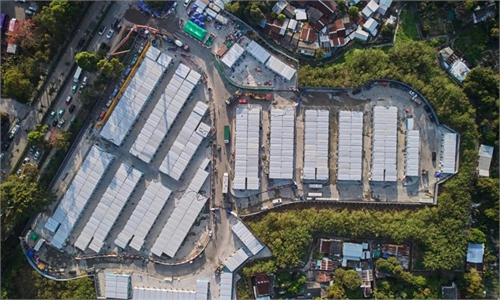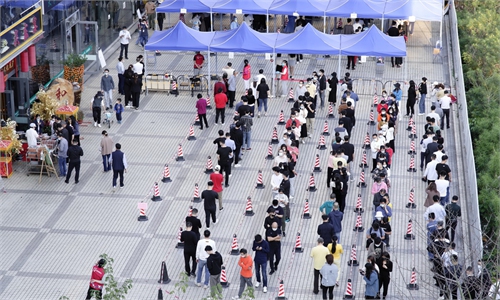
Residents line up for free nucleic acid testing at the special Information Port in Nanshan District of Shenzhen, South China's Guangdong Province. Shenzhen reports 66 local infections on March 13, taking up the total number to 432. Photo:IC
A number of manufacturing plants in Shenzhen, including those making iPhones, have halted production, after the southern megacity moved to take strict anti-epidemic measures in order to control a new wave of Omicron cases.
Experts warned that the situation in the tech hub could mean global supply chain hiccups, though if the disruption is brief, the impact can still be offset.
Authorities of Shenzhen, a city in South China's Guangdong Province with a population of 17.5 million, decided on Sunday to put all residential communities under closed management, shut down local transportation and launch three rounds of city-wide nucleic acid testing, starting from Monday, as the city has reported more coronavirus infections in recent days.
Shenzhen has an economic size similar to that of Thailand in 2020, which is also the hub for China's burgeoning technology sector. Shenzhen is also China's top exporting city with 1.92 trillion yuan ($300 billion) worth of goods exported in 2021.
With the exception of public service entities that supply essential goods and services including water, electricity, fuel and gas, as well as firms that are involved in the delivery and procurement of essential supplies for neighboring Hong Kong, other companies are asked to suspend production and business activities, and their employees are being asked to work remotely.
Shenzhen is known as the Silicon Valley of China, and it is home to China's high-tech companies making chips, smartphones, panel TVs, telecommunication hardware and drones.
As the city stepped up its epidemic control measures and ordered the temporary suspension of production, industry experts said the situation could add more uncertainty to disrupted global supply chain.
A senior semiconductor expert told the Global Times that a week-long suspension of production could be compensated for by faster shipments and production later on, but some hiccups in the supply and logistics chains could not be avoided. Prices may fluctuate and some items may go out of stock.
Operations of major iPhone assembler Foxconn in Shenzhen shut down starting on Monday, in compliance with the local government's new COVID-19 policy, the Global Times learned from the company.
The date for resumption of operations at Foxconn is yet to be advised by the local government and the company has adjusted its production line to minimize the potential impact, according to a statement sent by Hon Hai Technology Group (Foxconn) to the Global Times on Monday.
Foxconn has two major plants located at Longhua Science Park and Guanlan Science Park, covering 2.3 square kilometers and 2.95 square kilometers, respectively The plants produce Apple's iPhone, iPad, iMac and accessories.
Unimicron Technology Corp, a major printed circuit board manufacturer based in the island of Taiwan, announced the suspension of production on Monday in accordance with the city's epidemic control requirements.
An executive from one of the world's leading consumer tech firms told the Global Times that his company is assessing the impact of outbreak.
Electric vehicle and personal protective equipment maker BYD, which employs some 40,000 people in the Pingshan district of Shenzhen, said it is implementing epidemic control measures in line with the local government's requirements.
Production of epidemic control materials has been unimpeded, a staffer with a relevant company said, requesting anonymity. "Office work is now done remotely."
Wang Xin, president of the Shenzhen Cross-Border E-Commerce Association, told the Global Times on Monday that the "pause button" on the logistics chain, from warehouses to ports, could affect cross-border e-commerce and result in supply chain chokepoints.
Wang said her organization is communicating with the government over the rolling out of targeted policies for industries. "Companies can still receive orders from remote work, but logistics would be a headache," Wang said.
The Shenzhen branch of the People's Bank of China, the central bank, asked its outlets to prepare to ensure normal financial services. The branch told lenders to open up green channels to facilitate fund settlement and other financial services promptly.
Banks were also told to look after the needs of logistics companies handling freight between Shenzhen and Hong Kong, which is facing an even more arduous task to tame a voracious COVID-19 resurgence.
In line with new epidemic prevention and control measures, securities firms in the city have informed customers that business offices will temporarily suspend on-site business services from Monday to Friday.
On Sunday, six officials from Dongguan, Guangdong Province were removed from their posts for defects and loopholes in the daily epidemic prevention tasks at key venues in the city, especially their poor execution of duties that led to a cluster of infections in Dalang township in late February.
Dongguan city has also taken strict anti-epidemic measures, a member of the local business community told the Global Times. Production at many townships there is still normal as closed-loop management is being carried out inside industrial parks.
Dongguan closed schools and suspended public transportation on Monday, and it ordered communities and urban villages to carry out closed-loop management. The city, too, will have city-wide nucleic acid tests.
"Unlike Shenzhen, the workers inside the plants are easier to manage to meet epidemic control mandates," the person said. "However, some logistics hurdles in getting raw materials and delivering finished products are developing."
Dongguan ranked No.23 among Chinese cities in economic output and was the No.5 city in terms of foreign trade volume.
Shenzhen reported 75 new COVID-19 cases and 11 silent carriers on Sunday.



